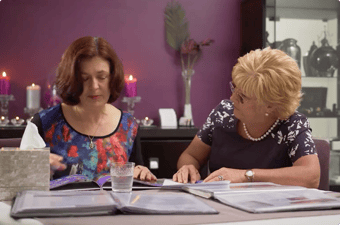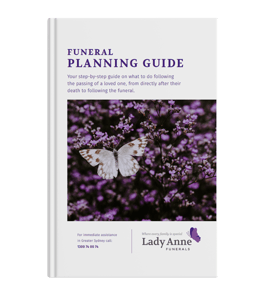Confronting the reality of a terminal illness is a heart-wrenching process, both for the diagnosed individual and their surrounding loved ones. It's a time filled with emotional upheaval, profound reflection, and, most importantly, meticulous planning for the time ahead. This guide, thoughtfully curated by Lady Anne Funerals, offers comprehensive and compassionate guidance for those on this journey.
In this guide, we will cover some of the most important practical aspects of planning for end of life, such as:
- Gathering of important documents
- Estate planning and legal matters
- Advanced care planning
- Funeral preparations
- Social media accounts
How long do I have to make these preparations?
The timeline for making end-of-life preparations can vary significantly based on the nature and progression of the terminal illness in question. Different diseases have distinct trajectories, and the progression of each illness can be influenced by numerous factors, including an individual's overall health, age, treatments received, and their body's response to those treatments.
For example, advanced pancreatic cancer might have a different prognosis compared to chronic obstructive pulmonary disease or advanced heart failure. Engaging in a candid conversation with your doctor can provide a clearer picture of the anticipated time you or a loved one might have left. This insight can be invaluable when prioritising preparations and making decisions about treatments and care.
However, it's essential to approach these conversations understanding that any timeline offered by a medical professional is an educated estimate. The human body, combined with the intricacies of each illness, can result in unexpected outcomes—some patients may live longer than initially anticipated, while others might face a faster progression of their illness. Regardless of the prognosis, it's beneficial to be proactive in planning to provide both peace of mind for yourself and clarity for your loved ones.
Helpful life-expectancy resources for common terminal illnesses:
- Advanced Pancreatic Cancer
- Chronic Obstructive Pulmonary Disease (COPD)
- Advanced Heart Failure
- End-stage Renal Disease
- Mesothelioma
- Amyotrophic Lateral Sclerosis (ALS)
- Advanced Alzheimer's Disease
- Metastatic Lung Cancer
- End-stage Liver Disease
Practical end-of-life preparations
Getting affairs in order is an important task to consider as early as possible. With terminal illness, there can be an eventual incapacitation or inability to communicate, which is why planning ahead (if possible) is a decision that will help you and your loved ones.
1. Gathering of important documents
Ensuring that all the necessary paperwork is in order can reduce administrative stress during a difficult time.
- Birth Certificate: This foundational document certifies one's identity and is a primary requirement for many posthumous proceedings. Keeping the original and some copies readily accessible is vital.
- Marriage or Divorce Certificates: These documents not only verify your relationship status but also can be crucial when discerning the rightful claimants of your estate, especially in complicated family situations.
- Medical Records: Comprehensive medical documentation helps caregivers and medical professionals make informed decisions regarding treatment, especially if the disease progresses to a stage where verbal communication becomes challenging.
- Tax Records and Financial Statements: Your executor will need these documents when managing your estate, settling debts, and distributing assets.
- Property Deeds: If you own property, be it land, houses, or other types of real estate, having the deeds ready ensures a smoother transition of assets.
- Superannuation Documents: In Australia, superannuation can sometimes contain insurance elements, making these papers crucial for family members to claim potential benefits.
- Life Insurance Policies: Should you have a policy, this will detail the benefits your beneficiaries are entitled to.
- Bank Account Details: Necessary for ongoing financial obligations, ensuring bills are paid, and subscriptions are halted.
2. Estate planning and legal matters
Estate planning is a forward-thinking process, ensuring that your assets and wealth are distributed according to your wishes after your passing. It not only involves deciding how your assets will be allocated, but also who will handle the responsibility of executing those wishes. An effective estate plan alleviates potential burdens on loved ones during an already challenging time and offers peace of mind that your desires, both financial and personal, will be respected and followed through.
Create a legal will
Wills are legally binding documents that articulate how you want your assets (often termed your 'estate') to be distributed upon your death. This could include property, money, investments, and personal items of sentimental value. Additionally, if you have children under 18, your will can specify who you want to be their guardian.
Without a will, the distribution of your assets is determined by state law, which might not always align with your personal wishes. Creating a will can also help avoid family disputes over inheritance and ensure that your loved ones are taken care of in the manner you envisioned.
Tips for creating a will:
- Seek legal advice to ensure the will is valid and comprehensive.
- Regularly review and update your will, especially after significant life events like marriage, the birth of a child, or the acquisition of major assets.
APPOINT A POWER OF ATTORNEY
A Power of Attorney is a legal document that grants one or more individuals the authority to make decisions on your behalf if you become incapacitated. There are different types of powers of attorney, including:
- General Power of Attorney: This gives someone authority to make decisions for you over a specific time frame, often used when you're overseas or unable to act for a short period.
- Enduring Power of Attorney: This lasts indefinitely and becomes effective if you're incapacitated. It can cover financial, personal, or health decisions.
Given the significant responsibility bestowed upon the person (or people) you appoint, it's crucial to choose someone you trust implicitly.
APPOINT AN EXECUTOR
An executor is a person you designate in your will to carry out your final wishes. They are responsible for a range of duties, including:
- Locating your will and initiating the probate process.
- Notifying relevant entities of your death, like banks and government agencies.
- Paying off any debts or taxes from your estate.
- Distributing the remaining assets to the beneficiaries as specified in your will.
Selecting a trustworthy and competent executor is crucial. They should be someone capable of handling financial matters and potential conflicts. Many people choose a close family member, but it's also common to appoint a solicitor or a trusted financial advisor.
APPOINT AN ENDURING GUARDIAN
An Enduring Guardian is someone you appoint to make personal, health, or lifestyle decisions on your behalf should you lose the capacity to do so yourself. This role differs from a Power of Attorney, which primarily focuses on financial and legal matters. Duties of an enduring guardian might include decisions about:
- Where you live, whether that's in your home, with family, or in a care facility.
- Health treatments you should or shouldn't undergo.
- Any other personal services that ensure your wellbeing and quality of life.
It's of utmost importance to appoint someone who understands and respects your values and wishes. Regular conversations with your chosen guardian about your preferences will ensure they're equipped to act in your best interest when the time comes.
3. Advance care planning
Advance care planning is a thorough process that involves deliberating, discussing, and making decisions about your future healthcare. It provides clarity around treatment choices and ensures that your wishes are respected even when you might not be in a position to communicate them. The primary objective is to achieve care that aligns with your values, beliefs, and preferences.
ADVANCE CARE PLAN
Advance care planning entails conversations that delve into an individual's beliefs and wishes concerning their forthcoming healthcare needs, encompassing care during the final stages of life. Such discussions can happen amongst loved ones at any point in life. However, for elderly individuals, those grappling with long-term illnesses, or those with cognitive challenges like dementia, this process might also include consultations with medical practitioners or health experts.
Through these discussions, one might decide to formalise their wishes in an Advance Care Directive - explained below.
ADVANCE CARE DIRECTIVE
An Advance Care Directive (also referred to as ‘Living Will’) is a formalised statement that sets out your wishes regarding future medical care. It can be as specific or as general as you desire, but it is crucial to be clear about certain treatments you want or don't want. For instance:
- Resuscitation preferences in the event of a cardiac arrest.
- Desired interventions for life-sustaining treatments, such as mechanical ventilation or artificial nutrition.
- Preferences about receiving palliative care or pain management.
Advance care directives differ between states and territories. Some state and territory governments have specific forms that you can use. Refer to this web page for further information.
4. Funeral preparations
Facing the inevitable reality of our mortality often prompts reflections on how we want to be remembered, and how we'd like to bid our final farewell. Planning one's own funeral can seem a daunting and melancholic task, yet it's a profound act of love, ensuring that your last rites resonate with your life's values, beliefs, and unique essence.
By meticulously designing your funeral, you not only ease the decision-making burden on loved ones during an emotionally taxing time, but you also ensure that the ceremony truly encapsulates your spirit, wishes, and the legacy you hope to leave behind. Whether it's choosing between burial and cremation, selecting a tranquil resting place, or picking out the hymns and readings that touched your soul, every detail matters in commemorating a life lived fully.
DECIDING ON THE SERVICE TYPE
While some may lean towards traditional burials, others prefer cremations or even eco-friendly options, such as a natural burial. Each choice resonates differently with individuals based on personal, environmental, or religious beliefs.
LOCATION CONSIDERATIONS
Determine where you'd like your final resting place to be. Whether it's a family plot, next to a significant other, or in a particular cemetery, these decisions hold immense emotional weight.
SERVICE PREFERENCES
Here's where you can outline the ambiance of your memorial service. Perhaps there's a special song that encapsulates your life, a poem that resonates with your soul, or a specific religious ritual that you'd like observed.
PREPAYING A FUNERAL SERVICE
Prepaid funerals have emerged as a pragmatic approach for those wanting to plan ahead and alleviate the financial burden on their families after their passing. Not only does this provide financial peace of mind, but it also ensures your specific wishes are documented and adhered to. This arrangement creates a harmonious balance of financial foresight and personal sentiment, ensuring that every aspect of your final farewell aligns with your vision while safeguarding your loved ones from unforeseen expenses.
5. Social media accounts
In our modern, interconnected world, our digital footprints have become as significant as our physical presence. The realms we inhabit online, particularly through social media, carry memories, connections, and fragments of our lives.
These platforms have become places where we share milestones, forge relationships, and express our identities. Consequently, as we ponder end-of-life preparations, it becomes imperative to consider our digital legacy.
Addressing what will happen to our social media profiles, email accounts, and other online assets ensures that our digital memories are preserved, managed, or concluded in a way that aligns with our wishes. By being proactive, we can provide clarity and reduce ambiguity for our loved ones, giving them the tools to navigate our digital realms when we're no longer here to guide them.
PREPARING A LIST
Start by cataloguing all your online accounts, from email to social media platforms, along with their passwords.
ACCOUNT INSTRUCTIONS
Decide what you'd like done with your social media accounts.Platforms like Facebook allow for memorialisation. Outline what you'd like done with each account – be it deletion, turning it into a tribute, or passing the baton to someone else.
Emotional end-of-life preparations
In the journey of preparing for the end of life, while the logistical aspects such as documents and finances are of paramount importance, the emotional dimensions hold a special, immeasurable value. The closing chapters of our lives often bring a heightened awareness of the connections that have shaped our existence and the cultural or spiritual beliefs that have given it meaning.
By consciously addressing these areas, we not only find solace and closure for ourselves, but also ease the journey for those left behind. This emotional preparation encompasses both our interpersonal relationships and our spiritual or cultural affiliations.
1. Honouring important relationships
As the end of life approaches, relationships often come into sharper focus. It's a time to reflect on the bonds formed over the years, to mend any lingering misunderstandings, and to express gratitude and appreciation. For many, it's essential to communicate final thoughts, share memories, or simply spend quality time with those who have been an integral part of their journey. Strengthening these connections can offer mutual comfort and understanding, ensuring that no words are left unsaid and that both parties find a sense of closure.
Some tasks related to honouring relationships could include the following:
- Leaving messages: Leave behind letters, videos or even voice recordings that encapsulate your feelings, wisdom, and love for friends and family to treasure. These tangible mementos can serve as lasting reminders of your bond with loved ones.
- Spending time with those you love: Identify those individuals whose presence will bring comfort, peace, and solace during your final days. By being deliberate in your choices, you ensure that your last moments are spent with those who have had the most profound impact on your life.
- Reconnecting: Reflect on your life's journey and consider reaching out to old friends, or loved ones you've drifted away from over the years. Rekindling these connections can offer both parties a sense of reconciliation and joy.
- Giving and receiving closure: Address unresolved issues, misunderstandings, or past conflicts. Engaging in open conversations can pave the way for mutual forgiveness and provide a sense of peace, ensuring that both parties move forward without lingering regrets.
- Creating memory journals: Collaborate with close friends and family to create journals filled with photographs, anecdotes, and shared experiences. These journals can be a therapeutic way to relive special moments and offer a lasting keepsake for loved ones.
- Hosting meaningful gatherings: Organise intimate get-togethers or ceremonies where friends and family can come together to celebrate your life, share stories, and offer support to each other.
- Passing on Heirlooms: Consider gifting cherished possessions or heirlooms to special individuals in your life. Accompanying these items with a note explaining their significance can make the gesture even more poignant.
- Empowering loved ones: Offer guidance and advice to those you're leaving behind, empowering them to live their lives fully, pursue their dreams, and find happiness even in your absence.
- Recording Your Life Story: Share your personal journey, lessons learned, and the wisdom gathered over the years through an autobiography or oral history. This record can be a priceless gift for future generations, offering them a glimpse into your life and the times you've lived through. There are life story services online such as Storyworth that can help you with this.
2. Spiritual and cultural practices
evMany individuals find comfort in the traditions, rituals, and beliefs of their spiritual or cultural background, especially when facing the end of life. Recognising and honouring these can provide immense solace and meaning during such a profound time. Here's a list of spiritual and cultural considerations one might reflect upon:
- Final Rites and Rituals: Identify specific ceremonies, rites, or prayers from your tradition to be performed at the end of life or posthumously.
- Sacred Texts and Prayers: Prepare key scriptures, mantras, or prayers that you wish to be recited, ensuring they are accessible.
- Symbols and Artefacts: Determine any significant religious symbols or cultural artefacts, like rosaries or amulets, to be kept close or displayed.
- Dietary and Fasting Practices: Communicate any religious dietary restrictions or fasting rituals to caregivers.
- Visitation Practices: Outline any tradition-specific guidelines about visitors and their conduct.
- Music and Chants: Consider sacred music or chants that resonate with your beliefs to play during your final moments.
- Attire and Grooming: Specify cultural or religious attire preferences, and any grooming practices to be adhered to.
- Handling of the Body: Detail how the body should be treated post-death, including washing, dressing, and positioning specifics.
- Mourning and Memorial Practices: Provide guidelines on any post-death mourning rituals or observances.
- Place of Rest: Decide on the preferred location for burial or resting, be it a religious site, family plot, or nature spot.
Take the next steps now
Feel free to copy and paste the below list somewhere so that you can work through the items
Practical end-of-life preparations
- Gathering of important documents
- Birth certificate
- Marriage or Divorce Certificates
- Medical Records
- Tax Records and Financial Statements
- Property Deeds
- Superannuation Documents
- Life Insurance Policies
- Bank Account Details
- Estate planning and legal matters
- Update or create a Legal Will
- Appoint a Power of Attorney
- General Power of Attorney
- Enduring Power of Attorney
- Appoint an Executor
- Appoint an Enduring Guardian
- Advance care planning
- Advance Care Plan
- Advance Care Directive
- Funeral preparations
- Service type
- Location considerations
- Service preferences
- Prepaid funeral
- Social media accounts
- Preparing a list
- Account instructions
Emotional end-of-life preparations
- Honouring important relationships
- Leaving messages
- Spending time with those you love
- Reconnecting with old friends/loved ones
- Giving and receiving closure
- Creating memory journals
- Hosting meaningful gatherings
- Passing on Heirlooms
- Empowering loved ones
- Recording Your Life Story
- Spiritual and cultural practices
- Final Rites and Rituals
- Sacred Texts and Prayers
- Symbols and Artefacts
- Dietary and Fasting Practices
- Visitation Practices
- Music and Chants
- Attire and Grooming
- Handling of the Body
- Mourning and Memorial Practices
- Place of Rest





